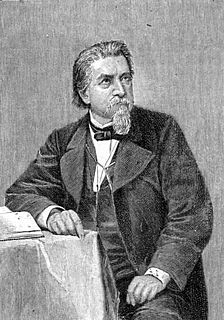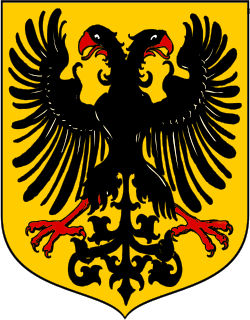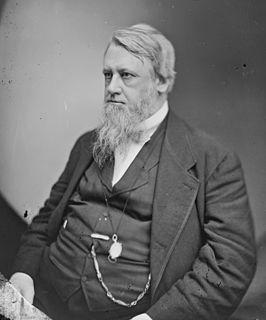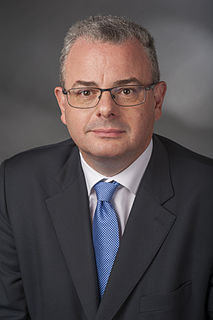
Frankfurt (Oder) is a town in Brandenburg, Germany, located on the west side of the Oder River, on the Germany-Poland border, about 80 kilometres (50 mi) east of Berlin.

The German revolutions of 1848–49, the opening phase of which was also called the March Revolution, were initially part of the Revolutions of 1848 that broke out in many European countries. They were a series of loosely coordinated protests and rebellions in the states of the German Confederation, including the Austrian Empire. The revolutions, which stressed pan-Germanism, demonstrated popular discontent with the traditional, largely autocratic political structure of the thirty-nine independent states of the Confederation that inherited the German territory of the former Holy Roman Empire after its dismantlement as a result of the Napoleonic Wars. This process began in the mid 1840s.

The Frankfurt Parliament was the first freely elected parliament for all of Germany, including the German-populated areas of Austria-Hungary, elected on 1 May 1848.

Karl Ferdinand Gutzkow was a German writer notable in the Young Germany movement of the mid-19th century.
This article aims to give a historical outline of liberalism in Germany. The liberal parties dealt with in the timeline below are, largely, those which received sufficient support at one time or another to have been represented in parliament. Not all parties so included, however, necessarily labeled themselves "liberal". The sign ⇒ denotes another party in that scheme.

The May Uprising took place in Dresden, Kingdom of Saxony in 1849; it was one of the last of the series of events known as the Revolutions of 1848.

St Paul's Church is a Protestant church in Paulsplatz, Frankfurt am Main with important political symbolism in Germany. It is a parish of the Protestant Church in Hesse and Nassau, a United member church of the Evangelical Church in Germany. It is notable for being the seat of the 1848 Frankfurt Parliament, the first publicly and freely-elected German legislative body.

For almost five centuries, the German city of Frankfurt was a city-state within two major Germanic entities:

The Federal Convention was the only central institution of the German Confederation from 1815 until 1848, and from 1850 until 1866. The Federal Assembly had its seat in the Palais Thurn und Taxis in Frankfurt. It was organized as a permanent congress of envoys.
The Frankfurt Constitution or Constitution of St. Paul's Church (Paulskirchenverfassung), officially named the Constitution of the German Empire of 28 March 1849, was an unsuccessful attempt to create a unified German nation state in the successor states of the Holy Roman Empire organised in the German Confederation. Adopted and proclaimed by the Frankfurt Parliament after the Revolutions of 1848, the constitution contained a charter of fundamental rights and a democratic government in the form of a constitutional monarchy. King Frederick William IV of Prussia was designated head of state as "Emperor of the Germans", a role he rejected.

The Bethmann family has been remarkable for the high proportion of its male members who succeeded at mercantile or financial endeavors. This family trait began in medieval northern Germany and continued with the Bethmann bank, which Johann Philipp Bethmann (1715–1793) and Simon Moritz Bethmann (1721–1782) founded in 1748 and soon catapulted into the foremost ranks of German and European banks. Even after the bank's sale in 1976, there are Bethmanns engaged in commercial real estate and forestry in the 21st century.

Wenzel Jaksch was a Sudeten German Social Democrat politician and the president of the Federation of Expellees in 1964 to 1966.

The United States Senate elections of 1876 and 1877 had the Democratic Party gain five seats in the United States Senate, and coincided with Rutherford B. Hayes's narrow election as President. Republicans remained in the majority, however.

The German Empire was a short-lived proto-state which existed from 1848 to 1849.
Sven Simon is a German law professor and politician who has been serving as a Member of the European Parliament since 2019. He previously taught International and European Law at Philipps University of Marburg. In the 2019 European Parliament election he was the lead candidate for the Christian Democratic Union Hessen.

Willi Birkelbach was a West German politician (SPD). He was a member of the West German Bundestag between 1949 and 1964. Between 1952 and 1964 he also served as an increasingly prominent Member of the European Parliament.

Bettina Stark-Watzinger is a German politician of the Free Democratic Party (FDP) who has been serving as a member of the Bundestag from the state of Hesse since 2017. Since 2021, she has been the chairwoman of the FDP in Hesse.

Axel Schäfer is a German politician of the Social Democratic Party (SPD). Born in Frankfurt, Hesse, he has been serving as a member of the Bundestag from the state of North Rhine-Westphalia since 2002.

Andreas Nick is a German politician of the Christian Democratic Union (CDU) who has been serving as a member of the Bundestag from the state of Rhineland-Palatinate since 2013.
Günter Henle, also known as Günther Henle was a German politician and music publisher. He was a member of the Christian Democratic Union (CDU) and of the German Bundestag. He founded the music publisher G. Henle Verlag.
















